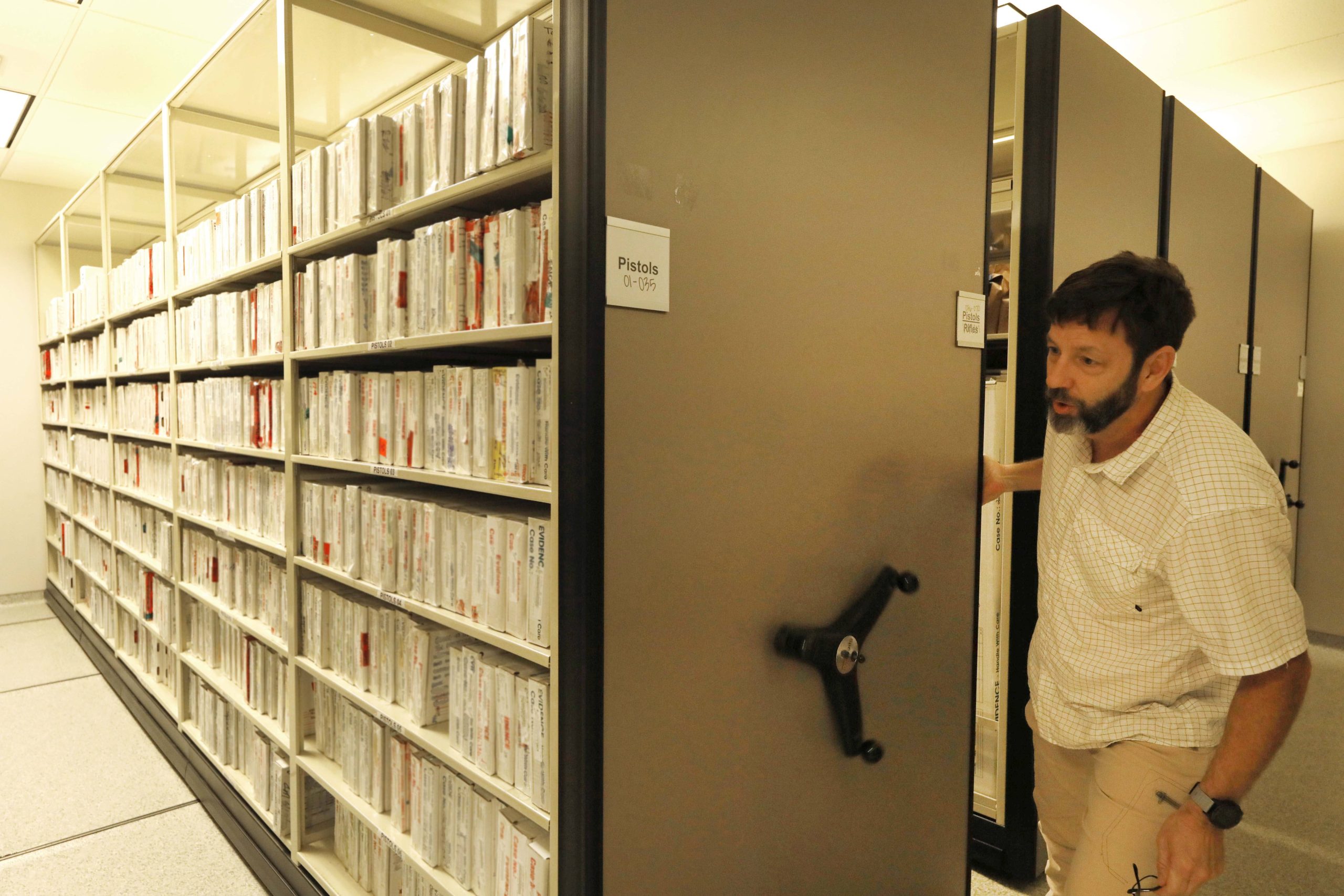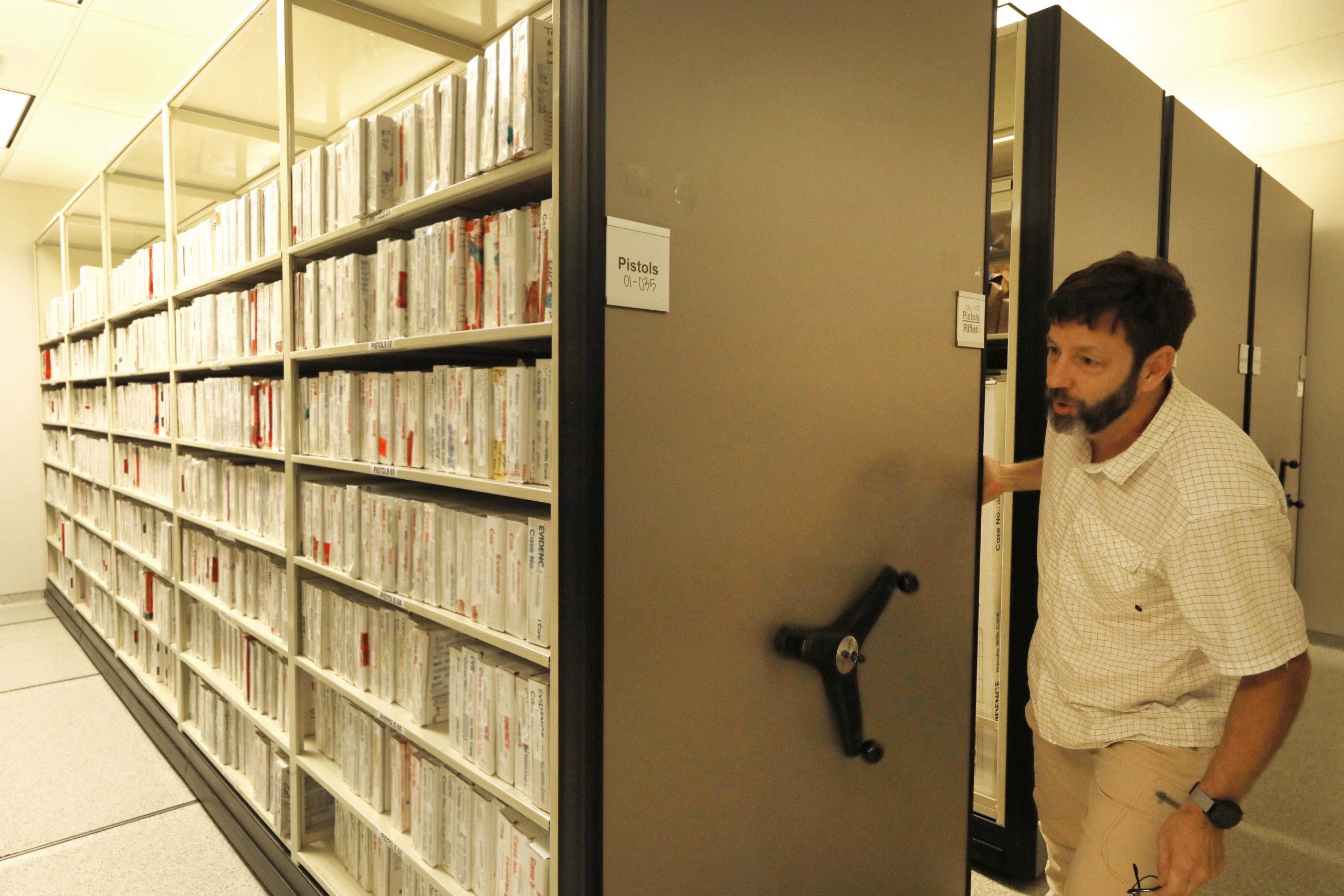Mississippi Today
Would a separate Jackson court end case backlog? Unlikely with state’s critically understaffed Crime Lab.


Would a separate Jackson court end case backlog? Unlikely with state’s critically understaffed Crime Lab.
Republican lawmakers want to create a separate, unelected judicial district in Jackson to clear Hinds County’s case backlog and address crime in Jackson, but the state’s overwhelmed and understaffed Crime Lab may make that impossible.
During more than four hours of debate on House Bill 1020, several Jackson lawmakers said the court has a backlog because of the Mississippi Forensics Laboratory, which is where local police departments, sheriffs and other law enforcement send evidence to be analyzed and used in trials.
“We can get two new judges appointed by the Supreme Court, but you know what? They’re going to have the same problem getting stuff from the Crime Lab,” said Rep. Earle Banks, D-Jackson.
Banks said judges across the state — not just in Hinds County — have problems receiving evidence from the Crime Lab in a timely manner.
The bill, which has attracted broad national scrutiny to the state, would create a Capitol Complex Improvement District courts system with two appointed judges as well as appointed prosecutors, public defenders and a clerk. The officials who would make the appointments – the Supreme Court Chief Justice and the state attorney general – are white, while a majority of Jackson and Hinds residents are Black.
The lack of manpower and resources at the state Crime Lab has a direct effect on the judges’ ability to move cases forward, a Hinds County judge told Mississippi Today this week. Often there is a delay, the judge said, because an autopsy hasn’t been completed or ballistics or lab results are pending or a lab expert isn’t available to testify.
During a Jan. 11 Senate Appropriations Committee meeting, Public Safety Commissioner Sean Tindell acknowledged the state’s forensic backlog has reached a critical level and is growing as staff leave.
With him were two state Crime Lab technicians who said they were quitting due to low pay. The entry salary for a scientist at the lab is $33,600 and requires a bachelor’s degree, which is a lower salary than other government agencies and the private sector offer. Additionally, raises for more senior staff were not enough, the former employees said.
The Crime Lab, which also handles autopsies through the state medical examiner’s office, also has a backlog, but that has been greatly reduced since 2020 due to hiring and contracting work supported by federal relief funds, Tindell said during the meeting. He said the goal is to have the autopsy backlog eliminated by the end of 2023.
As of Wednesday, the Crime Lab has 60 employees to process evidence, a DPS spokesperson said. Staffing has remained around that number for the past two years.
The Crime Lab received nearly 25,000 requests from state, local and federal agencies in 2017, according to the most recent publicly available report from DPS. There were about 60 scientists who received about 3,000 subpoenas for court testimony across Mississippi, according to the report.
All forensic scientists can be called to trial, and drug and firearms analysts are called in more often than the DNA analysts, the DPS spokesperson said.
Last year, the Legislature approved federal relief funds for Chief Justice Michael Randolph to appoint four special judges to the Hinds court system.
During debate about HB 1020, lawmakers also asked if increasing the number of elected judges in Hinds County could help work through the case backlog. As caseloads have increased over the years, lawmakers said four circuit court judges is not enough.
“I’ve heard about the (court) backlog and the problem, but not heard one single word (of) ‘Let’s increase the number of judges in Jackson, Mississippi. Let’s increase the amount of resources to operate,’” said Rep. Edward Blackmon Jr., D-Canton, during debate.
Bill author Rep. Trey Lamar, R-Senatobia, said the Legislature can look at potentially adding more elected judges during judicial redistricting. During judicial redistricting in 2015, judges were not added for Hinds County.
Jackson lawmakers said nobody asked them about the bill or what the city and county’s needs are for its criminal justice system, which they say could include more funding for the Jackson Police Department, support for Hinds County prosecutors and additional elected judges.
Rep. Zakiya Summers, D-Jackson, asked Lamar why the $1.6 million funding for the bill could not have been used to give resources to the city to address public safety concerns or to help the Hinds County court system reduce its case backlog.
“Lady, this is the bill that is before the body,” he replied.
House Bill 1020 was referred to the Senate’s Judiciary A Committee, which has a Feb. 28 deadline to be passed before it can be considered by the full Senate.
READ MORE: Hinds County forces unite against bill to create unelected judicial district, expanded police force
This article first appeared on Mississippi Today and is republished here under a Creative Commons license.
Did you miss our previous article…
https://www.biloxinewsevents.com/?p=209754
Mississippi Today
On this day in 1939, Billie Holiday recorded ‘Strange Fruit’

April 20, 1939

Legendary jazz singer Billie Holiday stepped into a Fifth Avenue studio and recorded “Strange Fruit,” a song written by Jewish civil rights activist Abel Meeropol, a high school English teacher upset about the lynchings of Black Americans — more than 6,400 between 1865 and 1950.
Meeropol and his wife had adopted the sons of Julius and Ethel Rosenberg, who were orphaned after their parents’ executions for espionage.
Holiday was drawn to the song, which reminded her of her father, who died when a hospital refused to treat him because he was Black. Weeks earlier, she had sung it for the first time at the Café Society in New York City. When she finished, she didn’t hear a sound.
“Then a lone person began to clap nervously,” she wrote in her memoir. “Then suddenly everybody was clapping.”
The song sold more than a million copies, and jazz writer Leonard Feather called it “the first significant protest in words and music, the first unmuted cry against racism.”
After her 1959 death, both she and the song went into the Grammy Hall of Fame, Time magazine called “Strange Fruit” the song of the century, and the British music publication Q included it among “10 songs that actually changed the world.”
David Margolick traces the tune’s journey through history in his book, “Strange Fruit: Billie Holiday and the Biography of a Song.” Andra Day won a Golden Globe for her portrayal of Holiday in the film, “The United States vs. Billie Holiday.”
This article first appeared on Mississippi Today and is republished here under a Creative Commons Attribution-NoDerivatives 4.0 International License.![]()
Mississippi Today
Mississippians are asked to vote more often than people in most other states

Not long after many Mississippi families celebrate Easter, they will be returning to the polls to vote in municipal party runoff elections.
The party runoff is April 22.
A year does not pass when there is not a significant election in the state. Mississippians have the opportunity to go to the polls more than voters in most — if not all — states.
In Mississippi, do not worry if your candidate loses because odds are it will not be long before you get to pick another candidate and vote in another election.
Mississippians go to the polls so much because it is one of only five states nationwide where the elections for governor and other statewide and local offices are held in odd years. In Mississippi, Kentucky and Louisiana, the election for governor and other statewide posts are held the year after the federal midterm elections. For those who might be confused by all the election lingo, the federal midterms are the elections held two years after the presidential election. All 435 members of the U.S. House and one-third of the membership of the U.S. Senate are up for election during every midterm. In Mississippi, there also are important judicial elections that coincide with the federal midterms.
Then the following year after the midterms, Mississippians are asked to go back to the polls to elect a governor, the seven other statewide offices and various other local and district posts.
Two states — Virginia and New Jersey — are electing governors and other state and local officials this year, the year after the presidential election.
The elections in New Jersey and Virginia are normally viewed as a bellwether of how the incumbent president is doing since they are the first statewide elections after the presidential election that was held the previous year. The elections in Virginia and New Jersey, for example, were viewed as a bad omen in 2021 for then-President Joe Biden and the Democrats since the Republican in the swing state of Virginia won the Governor’s Mansion and the Democrats won a closer-than-expected election for governor in the blue state of New Jersey.
With the exception of Mississippi, Louisiana, Kentucky, Virginia and New Jersey, all other states elect most of their state officials such as governor, legislators and local officials during even years — either to coincide with the federal midterms or the presidential elections.
And in Mississippi, to ensure that the democratic process is never too far out of sight and mind, most of the state’s roughly 300 municipalities hold elections in the other odd year of the four-year election cycle — this year.
The municipal election impacts many though not all Mississippians. Country dwellers will have no reason to go to the polls this year except for a few special elections. But in most Mississippi municipalities, the offices for mayor and city council/board of aldermen are up for election this year.
Jackson, the state’s largest and capital city, has perhaps the most high profile runoff election in which state Sen. John Horhn is challenging incumbent Mayor Chokwe Antar Lumumba in the Democratic primary.
Mississippi has been electing its governors in odd years for a long time. The 1890 Mississippi Constitution set the election for governor for 1895 and “every four years thereafter.”
There is an argument that the constant elections in Mississippi wears out voters, creating apathy resulting in lower voter turnout compared to some other states.
Turnout in presidential elections is normally lower in Mississippi than the nation as a whole. In 2024, despite the strong support for Republican Donald Trump in the state, 57.5% of registered voters went to the polls in Mississippi compared to the national average of 64%, according to the United States Elections Project.
In addition, Mississippi Today political reporter Taylor Vance theorizes that the odd year elections for state and local officials prolonged the political control for Mississippi Democrats. By 1948, Mississippians had started to vote for a candidate other than the Democrat for president. Mississippians began to vote for other candidates — first third party candidates and then Republicans — because of the national Democratic Party’s support of civil rights.
But because state elections were in odd years, it was easier for Mississippi Democrats to distance themselves from the national Democrats who were not on the ballot and win in state and local races.
In the modern Mississippi political environment, though, Republicans win most years — odd or even, state or federal elections. But Democrats will fare better this year in municipal elections than they do in most other contests in Mississippi, where the elections come fast and often.
This article first appeared on Mississippi Today and is republished here under a Creative Commons Attribution-NoDerivatives 4.0 International License.
Mississippi Today
On this day in 1977, Alex Haley awarded Pulitzer for ‘Roots’

April 19, 1977

Alex Haley was awarded a special Pulitzer Prize for “Roots,” which was also adapted for television.
Network executives worried that the depiction of the brutality of the slave experience might scare away viewers. Instead, 130 million Americans watched the epic miniseries, which meant that 85% of U.S. households watched the program.
The miniseries received 36 Emmy nominations and won nine. In 2016, the History Channel, Lifetime and A&E remade the miniseries, which won critical acclaim and received eight Emmy nominations.
This article first appeared on Mississippi Today and is republished here under a Creative Commons Attribution-NoDerivatives 4.0 International License.![]()
-

 News from the South - Alabama News Feed6 days ago
News from the South - Alabama News Feed6 days agoFoley man wins Race to the Finish as Kyle Larson gets first win of 2025 Xfinity Series at Bristol
-

 News from the South - Alabama News Feed6 days ago
News from the South - Alabama News Feed6 days agoFederal appeals court upholds ruling against Alabama panhandling laws
-

 News from the South - North Carolina News Feed5 days ago
News from the South - North Carolina News Feed5 days agoFDA warns about fake Ozempic, how to spot it
-

 News from the South - Virginia News Feed4 days ago
News from the South - Virginia News Feed4 days agoLieutenant governor race heats up with early fundraising surge | Virginia
-

 News from the South - Arkansas News Feed7 days ago
News from the South - Arkansas News Feed7 days agoTwo dead, 9 injured after shooting at Conway park | What we know
-

 News from the South - Missouri News Feed3 days ago
News from the South - Missouri News Feed3 days agoDrivers brace for upcoming I-70 construction, slowdowns
-

 News from the South - Missouri News Feed5 days ago
News from the South - Missouri News Feed5 days agoAbandoned property causing issues in Pine Lawn, neighbor demands action
-

 News from the South - Oklahoma News Feed4 days ago
News from the South - Oklahoma News Feed4 days agoThursday April 17, 2025 TIMELINE: Severe storms Friday


















































